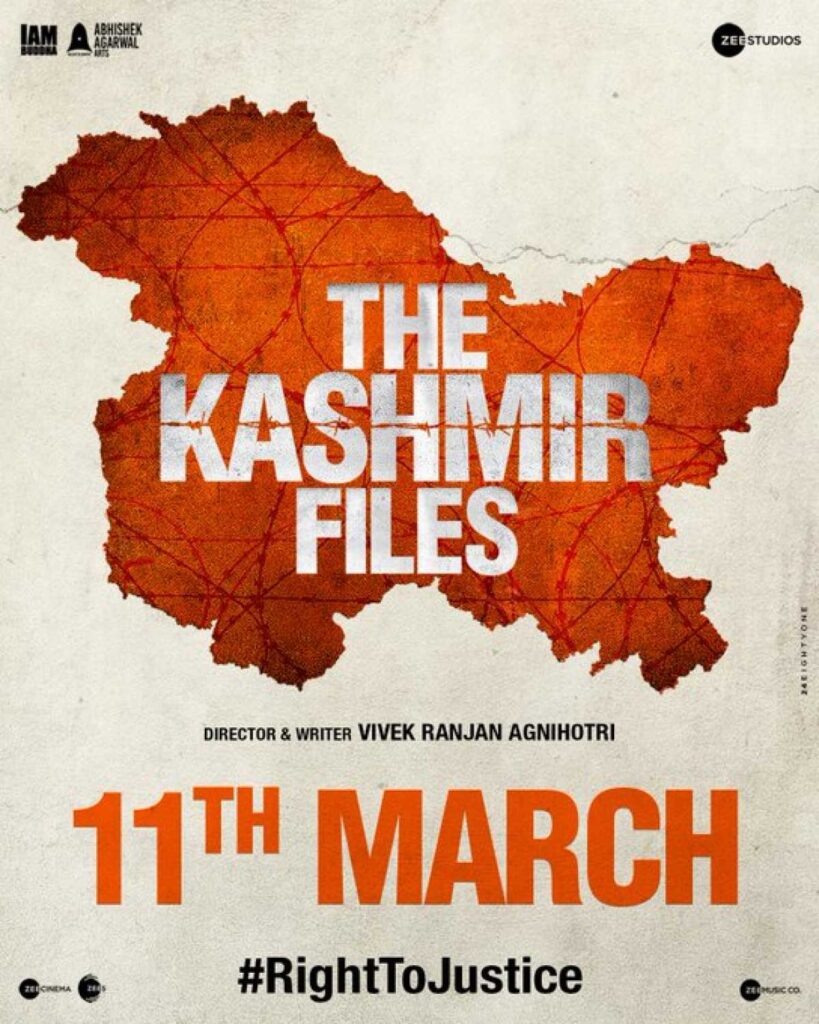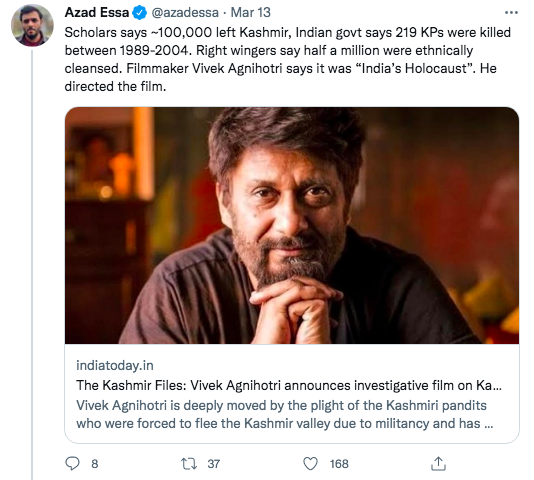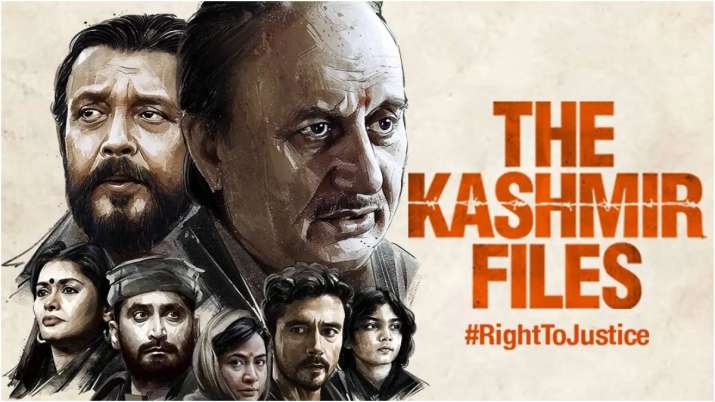Uncovering india’s Propaganda Movie “The Kashmir Files”.
June 30, 2022.
The writer’s name is hidden for anonymity.
Note from the author: As someone who identifies as a queer Kashmiri Pandit born and raised in the diaspora, I acknowledge that I have never lived under occupation or endured systemic Islamophobia, and that my experience differs greatly from those living in Kashmir. I will not be surveilled, detained or harassed by the Indian military like my Kashmiri Muslim peers in Kashmir. I have also not directly faced the hardships that many of my Kashmiri Pandit family and community faced in the 1990s. That being said, this film does not seek to center Pandit voices and pain to pursue a path of reconciliation between Kashmir’s diverse communities. Kashmir Files blatantly uses our community’s hardships in order to further the BJP’s agenda in Kashmir, further alienate our Kashmiri Muslim peers and refuses to understand Kashmiri history outside of their singular narrative.

India’s state-sponsored propaganda movie “Kashmir Files” has sparked controversy internationally.
“The Kashmir Files” was released amid broad endorsements by the BJP, India’s fascist ruling party. The film claims to tell the story of the departure of Kashmiri Pandits from Kashmir in 1990. While telling the story of Kashmiri Pandits is integral in confronting Kashmiri history, Kashmir Files demonizes Kashmiri Muslims and presents a narrow, singular story on the true victims of Kashmir’s military occupation. Kashmir Files is yet another, more prominent, example of comparing trauma with the intention of determining who has suffered the most. India’s colonial occupation has caused rifts between Kashmir’s religious communities.
The film’s director, Vivek Agnihotri, claims to center the Pandit’s suffering and tell the true history of Kashmir. While the Pandit suffering is highlighted, the community’s pain is exploited with the intentional vilification of the Kashmiri Muslim community. India’s state-sponsored propaganda movie “Kashmir Files” has sparked controversy internationally and was also banned in Singapore for its “provocative and one-sided portrayal” of Muslims that officials in the city-state fear has the “potential to cause enmity between different communities”.

Read the full thread here.
This film is politically driven, made with the intent to manipulate the traumas that the Pandit community have gone through to further a religious divide in Kashmir and in India. This film specifically promotes discrimination and violence against Muslim communities across India and Kashmir. The BJP-backed film aims to extract political clout and benefits from this event without actually doing anything to benefit Kashmiri Pandits. The film plays into the popular narrative that the Kashmir conflict is a conflict between Hindus and Muslims rather than what history shows the conflict is actually about – an uprising against India for popular demands for self-determination. The BJP, the film’s directors, producers, and supporters use this oversimplification of the conflict in order to further India’s political agenda in Kashmir and further delegitimize dissent in the region. Moreover, the exclusive focus on one community’s exile from Kashmir overlooks the fact that Kashmir’s repressive history has resulted in the mass migration of Muslims too.

Even as a large number of critics found The Kashmir Files filled with factual inaccuracies, propagandist, and frightening in its relentless targeting of every Muslim represented on screen, the film continued its blitz across the box office in India. Screenings frequently ended amid sloganeering and speeches, with people competing in their provocations, with brazen calls for violence against all Muslims, not just Kashmiri Muslims (via Al Jazeera).
This film claims to finally uncover the truth of what happened to the Kashmiri Pandits in the 1990s.
Sanjay Kak asserts that this claim by everyone associated with the film is at best, odd. BJP, other right wing groups and many in the Kashmiri Pandit community have aggressively promoted their version of events in Kashmir since at least the mid-1990s. In this version, the expulsion of the Kashmiri Pandits was dated to one day (January 19, 1990), accompanied by an insistence that their exodus was the consequence of widespread killings, the looting and burning of Pandit homes and temples, and a high incidence of sexual violence against Pandit women. The community were victims of a genocide, and this was framed as part of the larger threat to Hindu civilization that only the BJP and its cohort could counter.
This removes any targeted killings of Kashmiri Muslims, targeted killings of people who were openly supportive of India, and removes the mass suffering that the Kashmiri Muslim population faced as a result of intense militarization. The film also does not acknowledge that the killings of prominent Kashmiri Pandits were political in nature, not based on religious grounds. This is substantiated by the fact that Kashmiri Muslims who were openly pro-India, as well as pro-independence, were also killed at the same time. The film and the narrative it builds on also fails to address the fact that there has been no official investigation into what caused the Kashmiri Pandit exodus, like the fact there has been no investigation of mass enforced disappearances and rapes of Kashmiri Muslim populations.
Additionally, the indian filmmaker of the movie, Vivek Agnihotri, is an Islamophobe and a sexual predator.
He responds to all criticism of the Indian state by Kashmiri Muslims by describing them as “brainwashed and radicalized.” He refers to student pushback of his propaganda as playing the “Islamist victimhood card” — completely gaslighting the facts and the experiences of those whose families have been impacted by the Indian occupation of Kashmir. In 2018, Bollywood actress Tanushree Dutta accused him of sexually harassing her. He reportedly said to her: “take off your clothes and dance” (read more here). In 2019, Agnihotri and his entourage also assaulted a Kashmiri Muslim at an event (read more here).

Vivek Agnihotri.
In short, Kashmir Files is a classic cinematic tool for propaganda. It only serves to further India’s power and agenda in Kashmir.
Agnihotri, the film’s producers, and Pandit supporters of the film claim that the film will finally begin to bring justice to the Kashmiri Pandit community. If their version of justice is mass calls for genocide of Kashmiri Muslims, I have to call into question their definition of justice. Both Kashmiri Pandits and Kashmiri Muslims have suffered the brunt of this conflict and share painful histories, many of which extend beyond 1947. Kashmir Files seems to close off any chance of creating a space where steps towards justice, reconciliation, and self-determination can be taken.
Resources:
- https://www.aljazeera.com/opinions/2022/4/13/the-dangerous-truth-of-the-kashmiri-files
- https://umarsofi.substack.com/p/how-kashmir-files-does-both-peddles?s=r&utm_campaign=post&utm_medium=web&utm_source=direct
Stay in touch with Stand with Kashmir.
Stand With Kashmir (SWK) is a Kashmiri-driven independent, transnational, grassroots movement committed to standing in solidarity with the people of Indian occupied Kashmir in ending the Indian occupation of their homeland and supporting the right to self-determination of the pre-partition state of Jammu and Kashmir. We want to hear from you. If you have general inquiries, suggestions, or concerns, please email us at info@standwithkashmir.org.
©2025 StandWithKashmir All rights reserved. SWK is a 501(c)(3) non-for-profit organization.


Leave a Reply